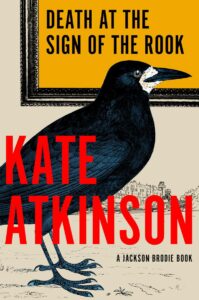September 10, 2024
DEATH AT THE SIGN OF A ROOK, by Kate Atkinson
I didn’t know I liked detective fiction until I read Case Histories in 2005 (apparently purchased with a gift token I got for my 26th birthday!), following up my introduction to Kate Atkinson with her stunning, award-winning debut Behind the Scenes at the Museum, but I have been devoted to Jackson Brodie ever since, and the book turned me on to the genre in general, a genre of which Atkinson is very aware in this latest Brodie instalment, Death at the Sign of the Rook. And it’s true that self-aware detective fiction is having a moment. Maybe it’s not a golden age, exactly, but I’m thinking about Knives Out and Glass Onion, and Richard Osman novels, Only Murder in the Building. Death at the Sign of the Rook begins with a murder mystery weekend at a great house, Brodie himself turning up (there has been a snowstorm and he’s stranded) along with the team of actors playing the parts, and can you imagine what it would be like to run a murder mystery with Jackson Brodie in the room? Atkinson has talked about writing this book in lockdown and her desire to have some fun with the experience, which makes this a lighter Jackson Brodie than we’ve encountered for a while. What leads to the great house begins with a series of art thefts in Northern England, Ilkley, specifically, which is one of my favourite English towns (and which I only visited in the first place because I’d read about Betty’s in a Jackson Brodie novel, and Ilkley is the closest Betty’s location to where my UK family lives. And on my first visit there, I learned about Ilkley’s wonderful Grove Bookshop, which shows up in the novel twice!). Private Detective Jackson Brodie takes the case, and it overlaps with another case in which his protege Reggie Chase has worked, both cases also linked by vintage detective novels left at the scenes by a Agatha Christie-esque author called Nancy Styles. There’s a wacky family of aristocrats (as well as a reference to eccentric Englishmen not being as great as they seem, and Hugh Grant having a lot to answer for), a mysterious elder-carer (with a big bag), a vicar who has lost his faith and his voice, two sets of twins, a former soldier with PTSD and a prosthetic limb, and a murderer on the loose. And like everything Atkinson writes, the scale and pace are Shakespearean, references range from classical to contemporary, everything is just a little absurd, everyone so achingly human. I loved it.







Me too! Lots of fun and no disappointments.
Yay! I am glad you agree.